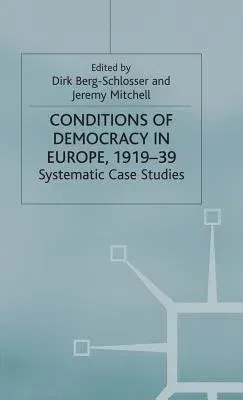The Conditions of Democracy in Europe 1919-39: Systematic Case Studies (2000)Hardcover - 2000, 24 February 2000

Qty
1
Turbo
Ships in 2 - 3 days
In Stock
Free Delivery
Cash on Delivery
15 Days
Free Returns
Secure Checkout

Part of Series
Advances in Political Science
Print Length
503 pages
Language
English
Publisher
Palgrave MacMillan
Date Published
24 Feb 2000
ISBN-10
0333648285
ISBN-13
9780333648285
Description
Product Details
Book Edition:
2000
Book Format:
Hardcover
Country of Origin:
US
Date Published:
24 February 2000
Dimensions:
21.59 x
13.97 x
3.33 cm
ISBN-10:
0333648285
ISBN-13:
9780333648285
Language:
English
Location:
London
Pages:
503
Publisher:
Weight:
807.39 gm